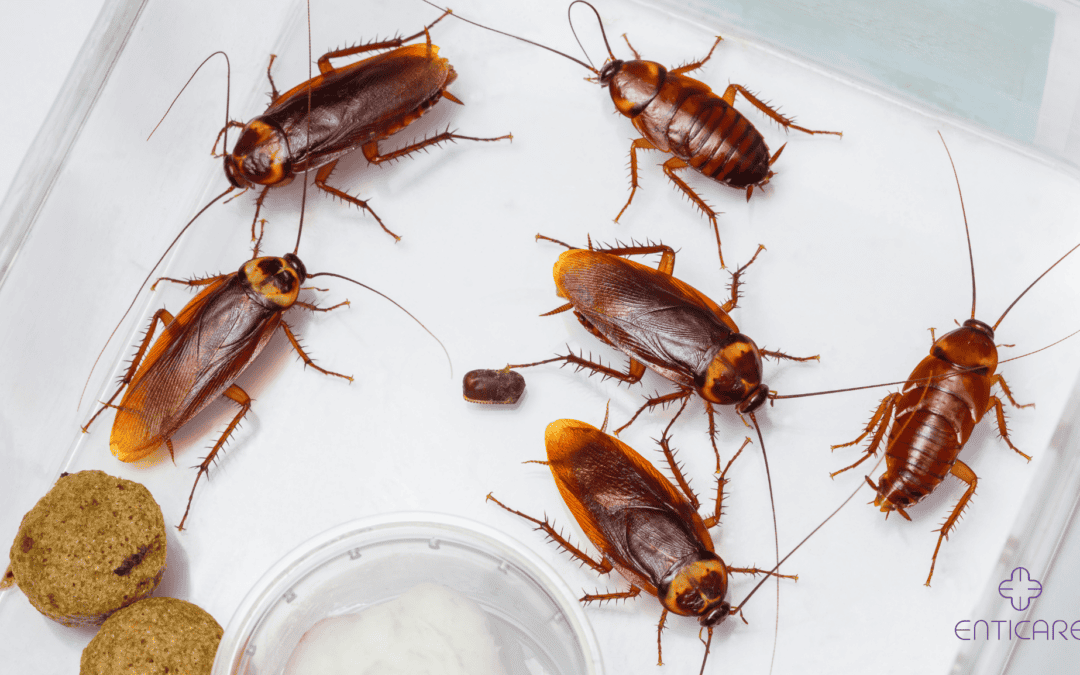Cockroach allergies can turn your home into a battleground for your health. Understanding the symptoms, getting a proper diagnosis, and finding effective solutions can help you reclaim your living space and breathe easier. Here’s a comprehensive guide to managing cockroach allergies.
Recognizing Cockroach Allergy Symptoms
Cockroach allergies manifest through a range of symptoms that affect different parts of the body. Identifying these symptoms early can lead to more effective management.
Respiratory Issues
Exposure to cockroach allergens often triggers respiratory problems. You might experience persistent coughing, wheezing, and shortness of breath. These symptoms can worsen during the night when cockroaches are most active.
Nasal Congestion and Sneezing
Cockroach allergens can cause nasal congestion and sneezing. You might notice a runny or stuffy nose, frequent sneezing, and postnasal drip. These symptoms are similar to those of other common allergies, making it important to identify the specific cause.
Skin Reactions
Direct contact with cockroach allergens can lead to skin reactions. You might develop itchy, red rashes or hives, particularly in areas where you come into contact with contaminated surfaces.
Diagnosing Cockroach Allergies
Accurate diagnosis is crucial for managing cockroach allergies effectively. Here are the steps involved:
Medical History and Symptom Evaluation
A healthcare provider will begin by taking a detailed medical history and evaluating your symptoms. They will ask about the onset and severity of your symptoms, your living environment, and potential exposure to cockroaches.
Skin Prick Test
A skin prick test helps identify specific allergies, including cockroach allergens. During this test, a healthcare provider places small amounts of allergens on your skin and pricks the surface. A small, raised bump will appear at the test site if you are allergic.
Blood Test
A blood test, known as a specific IgE test, measures the level of antibodies your immune system produces in response to cockroach allergens. This test can confirm the presence and severity of an allergy.
Preventing Cockroach Infestations
Preventing cockroach infestations is the first step in managing cockroach allergies. Here are some strategies to keep these pests out of your home:
Maintain Cleanliness
Regular cleaning reduces the likelihood of cockroach infestations. Clean your kitchen thoroughly, wiping down counters, and storing food in sealed containers. Dispose of garbage regularly and ensure trash cans have tight-fitting lids.
Eliminate Water Sources
Cockroaches thrive in moist environments. Fix any leaks in your home, including dripping faucets and pipes. Use a dehumidifier in damp areas like basements to reduce humidity levels.
Seal Entry Points
Prevent cockroaches from entering your home by sealing cracks and crevices in walls, floors, and windows. Use weatherstripping around doors and windows to close any gaps.
Managing Cockroach Allergies
Managing cockroach allergies involves reducing exposure to allergens and treating symptoms effectively. Here are some strategies:
Allergen Reduction
Reduce cockroach allergens by cleaning regularly. Vacuum carpets and upholstered furniture with a vacuum equipped with a HEPA filter. Wash bedding and curtains in hot water to eliminate allergens. Use air purifiers with HEPA filters to reduce airborne allergens.
Medications
Over-the-counter antihistamines can help alleviate mild allergy symptoms. Nasal corticosteroids reduce inflammation in your nasal passages. For more severe allergies, a healthcare provider might prescribe stronger medications or recommend immunotherapy (allergy shots).
Professional Pest Control
If cockroach infestations persist, consider professional pest control services. Exterminators can identify and eliminate cockroach nests, significantly reducing allergen levels in your home.
Cockroach Allergy Myths and Facts
Several myths surround cockroach allergies. Understanding the facts can help you manage your allergies more effectively.
Myth: Cockroach Allergies Only Occur in Dirty Homes
Cockroach allergies can occur in any home, regardless of cleanliness. Cockroaches seek food, water, and shelter, making even clean homes susceptible to infestations.
Myth: Cockroach Allergies Are Not Serious
Cockroach allergies can lead to serious health problems, particularly for individuals with asthma. Exposure to cockroach allergens can trigger asthma attacks and exacerbate symptoms.
Myth: DIY Pest Control Is Always Effective
DIY pest control methods can help reduce cockroach populations, but they might not eliminate infestations entirely. Professional pest control services offer more effective and long-lasting solutions.
Tips for Living Comfortably with Cockroach Allergies
You can manage cockroach allergies effectively and maintain a comfortable living environment by following these tips:
Regular Cleaning
Keep your home clean to reduce allergens. Dust surfaces with a damp cloth, mop floors regularly, and use air purifiers with HEPA filters to capture airborne allergens.
Personal Hygiene
Wash your hands after cleaning or handling items that might be contaminated with cockroach allergens. Avoid touching your face, especially your eyes, nose, and mouth, to prevent transferring allergens.
Allergy-Proofing Your Home
Use allergen-proof mattress and pillow covers to reduce exposure to allergens while you sleep. Keep windows closed during high cockroach activity periods, typically at night.
Conclusion: Take Control of Your Cockroach Allergies
Cockroach allergies can significantly impact your quality of life, but you can manage them effectively with the right strategies. By understanding your allergy, preventing infestations, and implementing effective management solutions, you can enjoy a comfortable and healthy living environment. For personalized advice and treatment options, schedule an appointment with our experts at Enticare. Dial 480-214-9000 and take the first step toward wellness.

